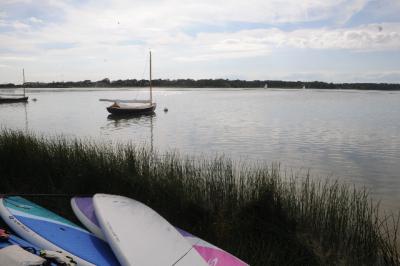‘Is the Pond Dying?’

“Do you feel the pond is in danger of dying?”
That was the question posed by the author and futurist Faith Popcorn to Diane McNally, clerk of the East Hampton Town Trustees, at that body’s meeting on Tuesday. Ms. Popcorn, along with other Georgica Pond shoreline homeowners, attended the meeting to express their concerns about the pond, which the trustees closed to crabbing and fishing on July 24 because of the discovery of cyanobacteria, or blue-green algae.
On Tuesday, the trustees resolved to maintain the pond’s closure to the harvesting of fish and crabs through Aug. 26, the date of their next meeting. Ms. McNally described the closure as precautionary. While there is no data confirming that crabs would be affected by the algal bloom or that consuming them or fish would be unsafe, the trustees determined on July 24 that “it is in the best interest of the public” to close the pond.
The extension can be rescinded before Aug. 26, Ms. McNally said, should testing determine that the algal bloom has dissipated. The trustees perform regular water-quality monitoring in conjunction with Christopher Gobler of Stony Brook University.
Ms. McNally said that Dr. Gobler had reported the continued existence of “minute levels” of the algae in the pond, and recommended its continued closure, in a discussion shortly before the trustees’ meeting. Ms. McNally and Dr. Gobler are to discuss the matter today in a meeting with East Hampton Town Supervisor Larry Cantwell, Mayor Paul F. Rickenbach Jr. of East Hampton Village, and Kim Shaw, the town’s director of natural resources.
“I don’t think it is dying,” Ms. McNally told Ms. Popcorn. However, she said, “It’s a huge problem because it encompasses the whole watershed.” The closing of one waterway, a popular site for crabbing, harms more than recreational users, she added. “The commercial guys have been losing money. The retail businesses that stocked up on crab nets have been losing money. Restaurants. It has been felt townwide, what the loss of one waterway can do to an economy.”
A long discussion ensued, encompassing what Bill Taylor, a trustee and the town’s waterways management supervisor, called the “thousand insults” to the pond. “It’s a whole attitude. It’s a death-of-a-thousand-cuts sort of thing,” he said, involving aging residential septic systems and wastewater.
In June, the Nature Conservancy, an organization that works to protect ecologically important lands and waterways, issued a report asserting that large quantities of nitrogen are leaching from onsite disposal systems into waterways on the South Fork, an overabundance of which is blamed for oxygen-depleted water, algal blooms, fin and shellfish kills, and the loss of seagrass and marsh habitat.
Fertilizers containing phosphorus and nitrogen are contributing to conditions ripe for oxygen-depleting algal blooms, said Deborah Klughers, a trustee. Shesuggested a peer-pressure campaign to discourage the overuse of fertilizers. “Write a letter to all your neighbors,” she told the shoreline property owners in attendance. “Say, ‘Please, let’s save the ecology of the pond. Just do what’s right for the planet.’ ”
After the Nature Conservancy’s report was issued, Mr. Taylor had said that, “Even going back 20, 25 years, you’d ride around in a boat and could pick out the places that were overfertilizing, easily. If it’s making your lawn green, it’s probably making your water green, too.”
“Make people humiliated to have a green lawn,” Ms. Popcorn urged. “That should be like smoking, a bad thing. . . . I’m not in your place, but I think we’re being too gentle.”
Ms. Klughers also suggested pressuring the Suffolk County Department of Health Services to approve new and affordable septic systems for residential use. “The septic systems are not denitrifying,” she said. “I would love to retrofit my existing septic system.”
“We would definitely advocate for Suffolk County Health Department to approve new and improved septics, and tax incentives for homeowners to upgrade before they have to,” Ms. McNally said. She said that all government agencies must educate residents as to how their actions are impacting the environment.
Ms. Popcorn suggested that the trustees and the Georgica Pond Homeowners Association meet regularly to discuss common interests. The trustees endorsed the idea.
